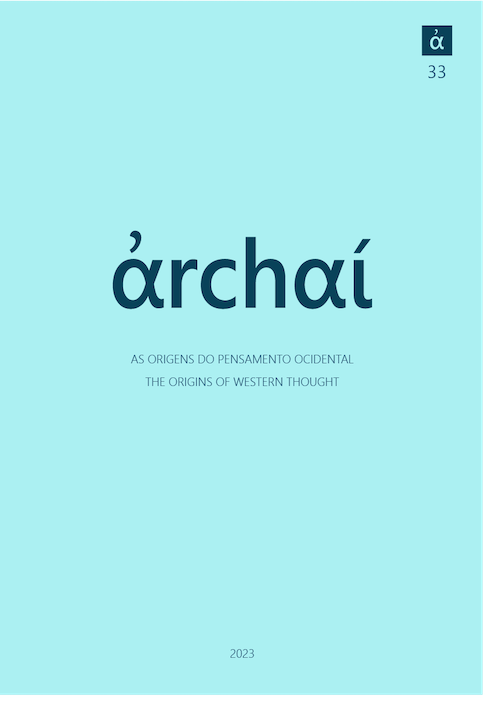Electra Tyrannicide: Gender in the Reception of a Heroic Deliberation in Sophocles’ Tragedy
DOI:
https://doi.org/10.14195/1984-249X_33_08Keywords:
tyrannicide, Sophocles’ Electra, gender, citizenship, Athenian democracyAbstract
At the third episode of Sophocles’ Electra, the heroine, believing that her brother Orestes is dead, invites her sister Chrisothemis to a plan to kill Aegisthus, in a speech that recalls fifth century Athenian’s public honors to the tyrannicide couple, Harmodius and Aristogiton, and thus presents the two sisters as a kind of democratic champions (v. 947-989). This paper compares the treatment given by contemporary Commentaries to Sophocles’ Electrato this speech with recent gender-oriented studies of Athenian citizenship, in order to argue that the idea of the ancient polisas a “man’s club” depends much more on a modern stereotype about Athenian politics than on the ancient evidence available to us –a stereotype that projects XIX century European conceptions of politics on the ancient context, and perpetuates backwards a supposedly universal masculine domination. In this light, Electra’s attitude, surely exceptional because of her equally exceptional situation, far from strikingly transgressing ancient gender-roles, points to the importance of female citizenship in democratic Athens.
Downloads
References
ANDRADE, M. M. (2011). O espaço funerário: comemorações privadas e exposição pública das mulheres em Atenas (séculos VI-IV a.C.). Revista Brasileira de História, v. 31, n. 61, p. 185-208.
AZOULAY, V. (2014). Les Tyrannicides d’Athènes. Vie et mort de deux statues. Paris, Seuil.
BOEHRINGER, S. (2005). Sexe, genre, sexualité: mode d’emploi (dans l’Antiquité). Kentron, v. 21, p. 89-90.
BLOK, J. (2017). Citizenship in Classical Athens. Cambridge, Cambridge University Press.
BROSE, R. (2007). Os fragmentos atenienses de Simônides. Dissertação de mestrado. Faculdade de Filosofia e Ciências Humanas da USP, São Paulo.
DE JONG, I. (1987). The Voice of Anonymity: tis-Speeches in the Iliad. Eranos, v. 85, p. 69-84.
DUNN, F.; LOMIENTO, L; GENTILLI, B. (2019). Sofocle: Elettra. Introduzione e commento di Francis Dunn, testo critico a cura di Liana Lomiento, traduzione di Bruno Gentili. Milano, Fondazione Lorenzo Valla/ Mondadori.
EASTERLING, P. (1984). The Tragic Homer. Bulletin of the Institute of Classical Studies, v. 31, p.1-8.
FINGLASS, P. (2007). Sophocles’ Electra. Cambridge Classical Texts and Commentaries v. 44. Cambridge, Cambridge University Press.
FOLEY, H. (2001). Female Acts in Greek Tragedy. Princeton, Princeton University Press.
HOMERO. (2018). Ilíada. Tradução de Christian Werner. São Paulo, Ubu/ SESI-SP.
JUFFRAS, D. (1991). Sophocles’ Electra 973-85 and Tyrannicide. Transactions of the American Philological Association, v. 121, p. 99-108.
KAMERBEEK, J. C. (1974). The Plays of Sophocles Commentaries. V: The Electra. Leiden, Brill.
LLOYD, J.; WILSON, N. G. (1992). Sophoclis fabulae. Oxford: Oxford University Press.
MACLEOD, L. (2001). Dolos and Dike in Sophokles’ Elektra. Leiden, Brill.
MARCH, J. (2001). Sophocles’ Electra. Edited with introduction, translation and commentary. Warminster, Aris & Phillips.
SEBILLOTTE CUCHET, V. (2015). Cidadãos e cidadãs na cidade grega clássica: onde atua o gênero? Revista Tempo, v. 21, n. 38, p. 1-20.
_____. (2016). Women and the Economic History of the Ancient Greek World: Still a Challenge for Gender Studies, in LION. B,; MICHEL, C. The Role of Women in Work and Society in the Ancient Near East. Studies in Ancient Near Eastern Records, v. 13, Boston-Berlin, De Gruyter, 2016, p. 543-563, para as referências. Disponível em https://halshs.archives-ouvertes.fr/halshs-01387030. Acessado em 10/2/2021.
_____. (2018a). Gender Studies et domination masculine. Les citoyennes de l’Athènes classique, un défi pour l’historien des institutions. Cahiers du Centre Gustave Glotz. Disponível em http://hal-paris1.archives-ouvertes.fr/halshs-01956493/fr/]. Acessado em 10/2/2021.
_____. (2018b). Quais direitos políticos para as cidadãs da Atenas clássica? Hélade, v. 4, n. 1, p. 143-158.
THOMAS, R. (2005). Letramento e oralidade na Grécia Antiga. Tradução de Raul Fiker. São Paulo, Odysseus.
WILSON, P. (2009). Tragic Honours and Democracy: Neglected Evidence for the Politics of the Athenian Dionysia. The Classical Quarterly, v. 59, p. 8-29.
WINKLER, J. (1990). The Constraints of Desire. The Anthropology of Sex and Gender in Ancient Greece. New York/London, Routledge.
Downloads
Published
How to Cite
Issue
Section
License
Copyright (c) 2023 Agatha Bacelar

This work is licensed under a Creative Commons Attribution 4.0 International License.
Given the public access policy of the journal, the use of the published texts is free, with the obligation of recognizing the original authorship and the first publication in this journal. The authors of the published contributions are entirely and exclusively responsible for their contents.
1. The authors authorize the publication of the article in this journal.
2. The authors guarantee that the contribution is original, and take full responsibility for its content in case of impugnation by third parties.
3. The authors guarantee that the contribution is not under evaluation in another journal.
4. The authors keep the copyright and convey to the journal the right of first publication, the work being licensed under a Creative Commons Attribution License-BY.
5. The authors are allowed and stimulated to publicize and distribute their work on-line after the publication in the journal.
6. The authors of the approved works authorize the journal to distribute their content, after publication, for reproduction in content indexes, virtual libraries and similars.
7. The editors reserve the right to make adjustments to the text and to adequate the article to the editorial rules of the journal.



